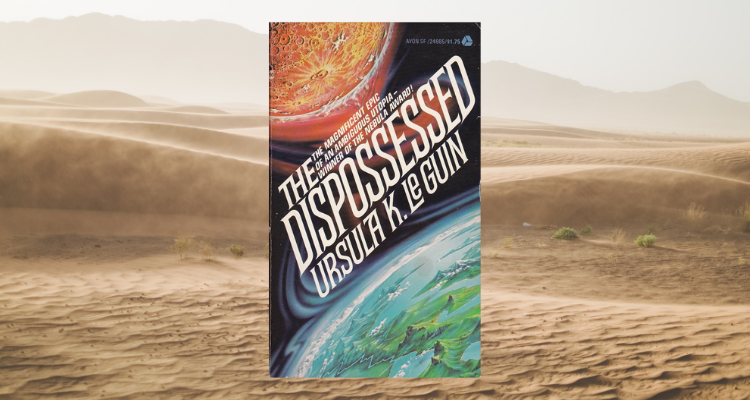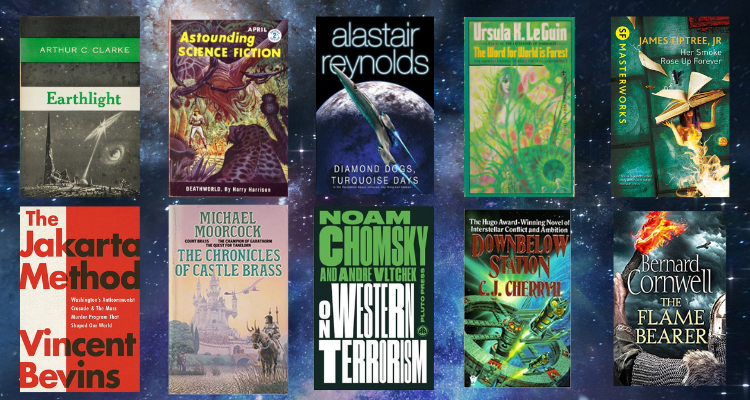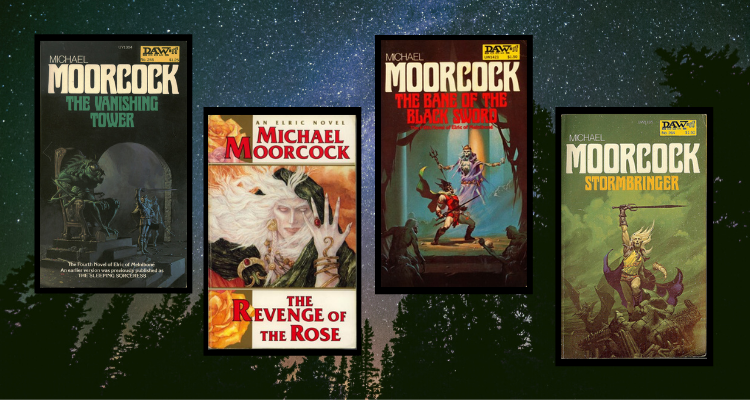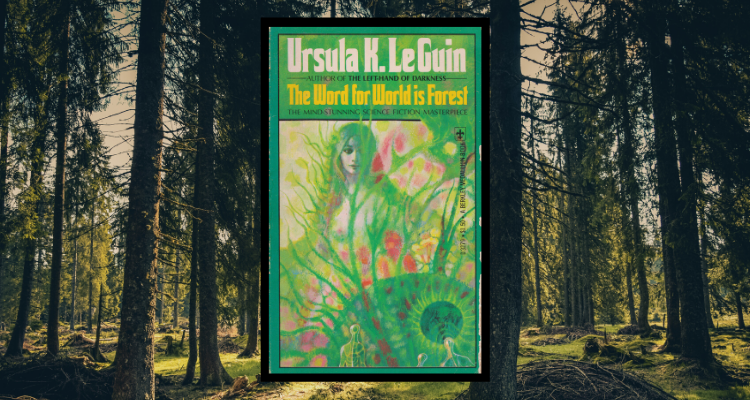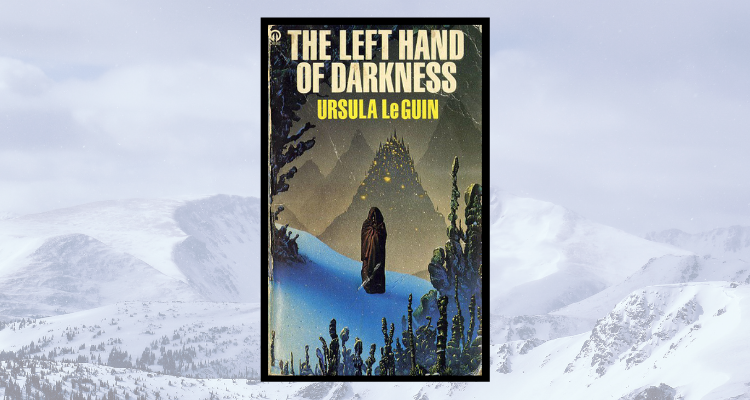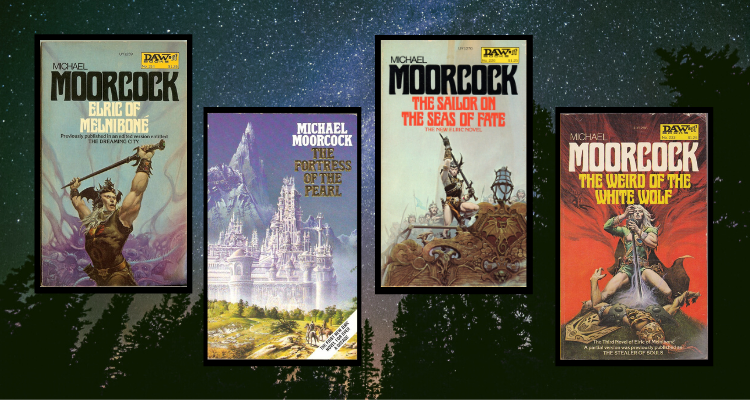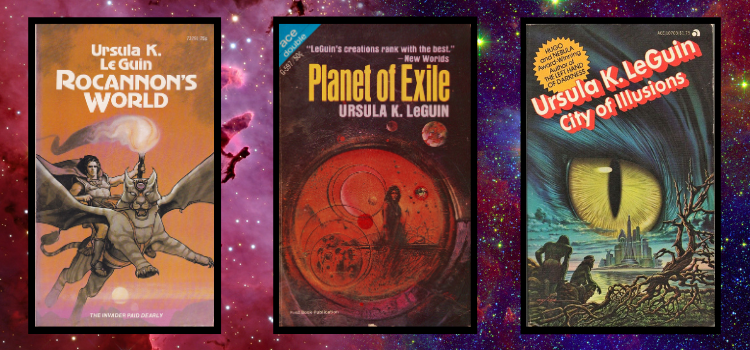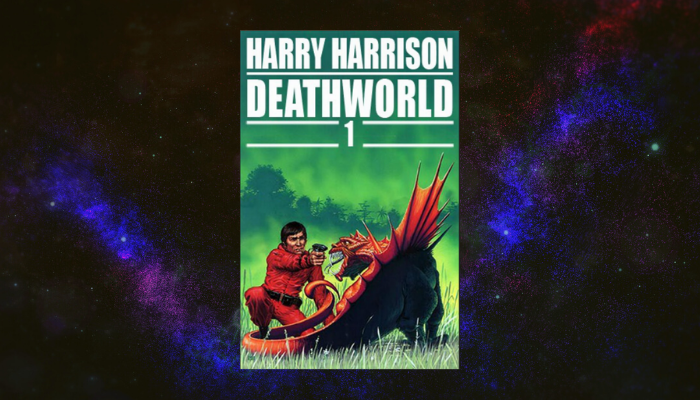|
Originally published in late 2008, the Destiny trilogy is a major linchpin of Star Trek tie-in fiction. This hugely ambitious series combines characters, ships and backstory from several TV series and films and is a deeply rewarding read for Star Trek fans.
0 Comments
Five books into her Hainish cycle, it is clear that one of Ursula K. Le Guin's goals with the series is to explore different ways of being, different kinds of society and how they interact. In doing so, Le Guin achieves what the best science fiction writers do - making readers consider other ways of life, and how they may compare with and improve upon their own. In her 1974 novel The Dispossessed, the sixth in the cycle, Le Guin does this more powerfully than ever before.
In this book, a number of distinct societies are compared. Its main character personally explores the two main societies, with others present in the background. He compares these systems within the narrative, judging one that is familiar to him against one to which he is new. While his society is in some senses a utopia - famously described as an “ambiguous utopia” - he is compelled to imagine a way of life that is better still, and so are we. After falling agonisingly short in 2019, this year I'm on track to finish 50 books. Of these, I've listed the ten that I enjoyed most and that I'd definitely recommend. As was the case last year, I've read a lot of classic sci-fi, but below you'll also find a chilling non-fiction book from this year, fantasy by Michael Moorcock, and historical fiction by the peerless Bernard Cornwell.
My overview of Michael Moorcock’s epic Elric saga continues, and concludes, with this second part. The guide covers the eight main novels in the sequence in their internal chronological order; to catch up with the first four novels, be sure to read or listen to part I.
Following those first four books, Elric has made enemies in what remains of his Melnibonéan people, and in the powerful sorcerer Theleb Ka’arna. More positively, he has made a stout ally in the form of Moonglum of Elwher. He has won great victories, and done terrible things, all with the demonic sword Stormbringer at his side. All of these events are factors in the stories which follow in books 5 to 8. Here, the chronology and provenance of the series becomes a bit more complicated. The four books were published out of sequence, during three decades. Confusingly, the book published first is actually the last in the main sequence. Hopefully, this concluding part of the guide will clear up the probable misunderstandings - rest assured that these are fine books, and a wild ride in the Multiverse.
By 1972, Ursula K. Le Guin was increasingly being seen as one of the most important writers of science fiction and fantasy. Following three fascinating but mostly ignored novels, the Oregon-based author and her Hainish series were brought to wide attention by The Left Hand of Darkness (1969). She had also published A Wizard of Earthsea (1968) and The Tombs of Atuan (1971), the first two entries in her Earthsea fantasy series, to some acclaim.
While Le Guin’s career was taking off, she was profoundly troubled by outside events - specifically the horror of the Vietnam War. This would profoundly influence the fifth entry in her Hainish series, The Word for World is Forest. As Ken MacLeod put it in his introduction, the book is a “reflection on invasion, exploitation and oppression, and on the necessity and cost of resistance.” While this description is accurate, it is also an understatement. While certainly a “reflection”, the novel is also a forceful howl of anger. Le Guin later wrote of science fiction not as a means of predicting the future, but of explaining and commenting on the present. While this process is evident in other examples of her work, The Word for World is Forest is particularly strongly suffused with the author’s feelings about contemporary events. Many of the elements of the book are analogues for aspects of the war then raging in Vietnam, and consequently the novella - only 126 pages long in the Gollancz SF Masterworks edition - feels direct and pointed. While Le Guin later regretted this bluntness, it is arguably crucial to its significance today. After all, its calls for tolerance, respect for the natural world, and fierce condemnation of colonialism are sadly as important now as ever.
Ursula K. Le Guin’s first three novels didn’t make much of an impact. Released in 1966 and 1967, they kicked off her acclaimed Hainish cycle but generated little notice at the time. The same certainly isn’t true of her next works. In 1968 Le Guin published A Wizard of Earthsea, which began her excellent Earthsea fantasy series. Then, in 1969, Ace Books released the hugely acclaimed SF novel with which Le Guin is most associated: The Left Hand of Darkness.
Now having sold over a million copies in English alone, The Left Hand of Darkness is regularly cited as one of the most important science fiction novels of all time. It won both the Nebula and Hugo Awards for Best Novel, appears prominently in numerous best-of lists, and has generated a great deal of academic attention. In many ways, this enduring success was surprising - at least to the author herself. In 2017, she wrote: “Left Hand looked to me like a natural flop. Its style is not the journalistic one that was then standard in science fiction, its structure is complex, it moves slowly, and even if everybody in it is called he, it is not about men. That's a big dose of "hard lit," heresy, and chutzpah, for a genre novel by a nobody in 1968.”
Here, Le Guin alludes to the most famous aspect of the book - its contribution to feminism and the discussion of gender in science fiction. This is a fascinating part of The Left Hand of Darkness, but Le Guin’s books can never be reduced to just one theme. The story covers ideas about cultural difference, loyalty, political conflict, and religion. It’s a highly recommended read in and of itself for anyone interested in SF, but also rewards some prior awareness of the wider Hainish series. As Charlie Jane Anders has written, “when read and considered as a whole, Le Guin’s Hainish Cycle feels like an even more impressive accomplishment than its stellar individual works.”
Created by Michael Moorcock in 1961 with the story “The Dreaming City”, Elric of Melniboné is one of the definitive characters in British fantasy fiction. A albino sorcerer and warrior with milk-white skin and hair, Elric is a magnetic antihero - cursed with a black sword which feeds on souls and bound to serve the capricious chaos deity, Arioch. In writing the Elric stories, Moorcock consciously worked to avoid repeating the high fantasy style of Tolkien - and in so doing inspired numerous subsequent imitators of his own.
While Elric is well-known to fans of fantasy, the character might even be a household name if the series were more approachable to read. Until relatively recently, the eight main novels in the sequence could be difficult to get hold of, and while the reissues by the publisher Gollancz are very welcome, they also leave something to be desired. The Michael Moorcock Collection is a mammoth undertaking, as it comprises no less than 28 volumes, most of them containing multiple novels. Gollancz and the mastermind of the project, John Davey, deserve a great deal of credit for making Moorcock’s work more available. Unfortunately, in the case of the Elric books very little indication is given as to reading order, or the circumstances in which the stories were originally published. Stories are inserted into odd places, and a lot of frankly extraneous material is inserted - presumably to bulk up the thinner volumes. Because the Elric stories were written out of sequence over a period of decades, and have been republished several times, there was already a high potential for confusion. Split into two parts, this introductory guide to the books lists and introduces them in order of their internal chronology. First, though, an introduction to the Pale Emperor himself.
Ursula K. LeGuin passed away on January 22, 2018. It was a tremendous loss. During a writing career that began in 1959, LeGuin published over 20 novels, over a dozen collections of short stories, and several books of poetry. She was an icon of both science fiction and fantasy, producing a hugely acclaimed cycle of novels in each genre. The Earthsea cycle is LeGuin’s primary contribution to fantasy, a set of five novels and a collection of short stories published between 1968 and 2001. She made an enormous impact on SF with the books in what others have called her “Hainish cycle”. LeGuin’s most acclaimed books, The Left Hand of Darkness (1969) and The Dispossessed (1974) form a part of this loose cycle.
All too often, discussion of LeGuin’s work begins and ends with these well-known and influential books. However, the three novels which preceded them, and which begin the Hainish cycle, are absolutely worthy of reading and examination in their own right. They are undoubtedly minor works compared to the books which made LeGuin’s name, but they introduce many of the concepts and themes which underpin the books written later.
In Seminyak, on the Indonesian island of Bali, there are numerous luxury hotels that cater to wealthy tourists from abroad. Westerners go there to enjoy “wellness” activities, or to drink cocktails on the beach. Very few of them realise that in 1965, people were brought to this same beach at night to be killed on the basis of their real or perceived political views. In all, around 5% of the population of Bali were killed by the military during the Indonesian massacres of 1965 to 1966. This was an appalling episode in the Cold War, but one which few people in the West are aware of. This silence is carefully maintained. At a museum in Santiago, Chile, an exhibit states that the Indonesian government “abolished the law that would establish their truth commission.”
This information comes from The Jakarta Method, a superb and unsettling book by Vincent Bevins. An American journalist who has spent time living in Indonesia and Brazil, Bevins has written an urgent, exhaustively researched, and thoroughly humane book. While the text makes clear the scale and horror of the atrocities that took place in Indonesia and other countries during the Cold War, Bevins does not dwell on the specifics of the killings. He focuses instead on setting the Indonesian massacre into a broader context. The book explains how the atrocities flowed from the rising tide of fanatical anticommunism that was spreading around the world; an international form of McCarthyism which suppressed almost any attempt at breaking away from the orthodox capitalist model.
Due to a number of stars that exploded in its vicinity, the planet Pyrrus is rich with valuable radioactive ores. A fortune can be made by anyone willing and able to exploit this resource - unfortunately, every last living creature on the planet is fanatically dedicated to killing humans. So goes the premise of Deathworld, and by the time the novel opens the human colonists have been fighting a brutal war with the whole ecosystem of Pyrrus for 300 years.
Published in 1960, Deathworld is the first novel by Harry Harrison (1925 - 2012). After a stint in the US Army Air Corps, Harrison worked as an illustrator and comics artist - notably for the controversial and influential EC Comics in the late 1940s. This experience would prepare him for his career as a science fiction author, which he began in earnest in 1951 with his first story sale. Deathworld establishes the style Harrison would become known for, being a fast-paced adventure infused with intriguing themes. |
About
I write about classic science fiction and occasionally fantasy; I sometimes make maps for Doom II; and I'm a contributor to the videogames site Entertainium, where I regularly review new games. Categories
All
|

